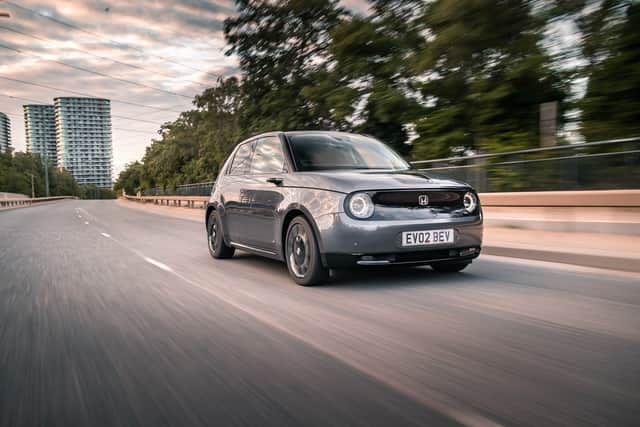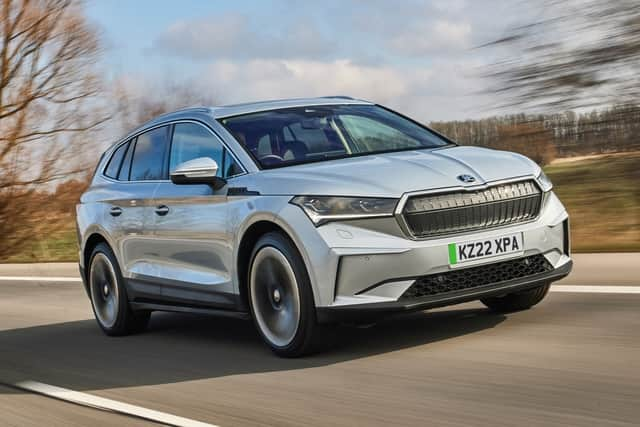Electric car costs: experts warn of ‘hidden barrier’ holding back EV sales
and live on Freeview channel 276
The UK’s shift towards electric cars by 2030 faces a “hidden barrier” that is holding back EV adoption, according to industry experts.
On World EV Day, observers from the retail, infrastructure and insurance sectors warned that despite soaring interest in electric cars, the lack of availability and affordability continued to put buyers off.
Advertisement
Hide AdAdvertisement
Hide AdAuto Trader’s commercial director Ian Plummer said that without action by the Government and car makers, the country could face a two-tier system by 2030 with “high-speed motorway for the rich and a rutted countryside track for everyone else”.
He urged new Prime Minister Liz Truss to “think imaginatively” to help promote EVs and consider everything from cutting VAT on public charging to ensuring that the roll-out of infrastructure benefits the whole country, and urged the Government to make the UK an attractive place for car makers to sell smaller, cheaper EVs.


Mr Plummer said that while the higher up-front price of EVs is well known, many of those interested in an electric car were being held back by the limited number of suitable vehicles.
He said: “One of the big impediments to EV adoption has been the relative lack of choice. While the choice of electric cars is now starting to accelerate with a threefold rise since the start of last year, there’s clearly a long way to go. Currently, buyers can choose from 65 different new electric models on Auto Trader’s marketplace, but that compares with 325 petrol/diesel models, and there is a dearth of choice in the high-volume segments of the car market.
Advertisement
Hide AdAdvertisement
Hide Ad“More and more electric cars are being introduced, but most are in the more expensive segments – anyone looking for a supermini or city car has very limited options. Put simply, even if they can afford the price premium (currently 36 per cent on average) car buyers may well find there is no EV model that suits their needs.”
More small EVs needed
The latest new car registration figures show that the supermini segment continues to be the biggest part of the market, accounting for a third of all sales, but there are relatively few all-electric options and those that exist are significantly more expensive than their petrol counterparts. A petrol Vauxhall Corsa, for example, starts at £17,440 or £229 per month while the Corsa-e is £29,305 or £366 per month.


A large proportion of EVs currently on sale are also mid-to-large-sized SUVs, with relatively few choices in the smaller family hatchback segment occupied by the Ford Focus and VW Golf.
Some brands are working to address the lack of small EVs. The Volkswagen group is develpoing an electric city car which will go on sale from 2025 and be sold by the VW, Skoda and Cupra brands. Nissan will launch an electric replacement for the Micra, which will share its platform with the revived Renault 5, and Fiat is planning an electric Panda which should be more affordable than the electric 500. MG has also just launched the MG4 - a rival to the VW ID.3 family hatchback that costs from £26,000.
Advertisement
Hide AdAdvertisement
Hide AdHowever, Mr Plummer said more cars needed to come to market quickly. He commented: “For manufacturers, the economics of EVs stack up less well in the more affordable and high volume segments, but this is precisely the part of the car market that EVs need to crack if we are to drive mass adoption. The government has a role to play in ensuring that the UK is an attractive place for manufacturers to introduce new EV options into high volume segments of the car market.”
Young drivers priced out
A new report compiled by a number of leading groups in the leasing, insurance and charging industries has also warned that the availability of affordable EV options needs to be addressed if the country is to meet its net zero target.
It found that while young drivers were the keenest to own an EV, they were being put off by the lack of affordable options and confusion around running costs.
Polling for the study found that 77% of those aged 25-34 years old would consider an EV as their next car but 39% thought financing one would be more expensive than a petrol alternative and 27% believed running costs would be higher as well - more than among any other age group.
Advertisement
Hide AdAdvertisement
Hide AdThe report’s authors said that work still needed to be done to make EVs more affordable and make it easier to compare lifetime costs with petrol and diesel equivalents.
Neill Emmett, head of marketing at LeasePlan UK - one of the groups behind the report, said: “In general, most EV models work out cheaper than diesel or petrol cars due to the lower whole-life costs. However, the upfront costs remain prohibitive, with many manufacturers pricing young people out of the market. We urgently need greater access to more financially attainable vehicles.”
Wealth divide
Mr Plummer added: “The share of EV advert views, according to the SMMT, is now 14.5%, up from 10.9% in August last year, but this sharp rise masks a big wealth divide.
“EV buyers are typically older, wealthier, and more suburban than the average buyer and unless the price disparity closes soon, there is a danger that the road to 2030 will be high speed motorway for the rich and a rutted countryside track for everyone else.
Advertisement
Hide AdAdvertisement
Hide Ad“The government has made it clear that it does not favour European style incentives and it has scrapped the plug-in grant, but it is incumbent on policymakers and the industry to work together to speed up the journey to price parity.
“The new Prime Minister needs to think imaginatively about ways to encourage EV adoptions. That should include measures like bolstering the UK’s charging infrastructure, which is far too focused on the South-East. Cutting the 20% VAT rate on public charging points would be welcome, as would extending the Workplace Charging Scheme for those unable to charge up at home. Even non-financial benefits like allowing EVs to drive in bus lanes could encourage switchers. We cannot lose sight of the bigger prize.”
His view was echoed by the authors of the report, who said policymakers and industry needed to do “everything possible” to make EVs more affordable. Among their suggestions were for a cut in VAT on public charging to 5% and for Westminster to consider a scheme such as Transport Scotland’s interest-free loan for used electric vehicles to help encourage more drivers to switch.
Comment Guidelines
National World encourages reader discussion on our stories. User feedback, insights and back-and-forth exchanges add a rich layer of context to reporting. Please review our Community Guidelines before commenting.
